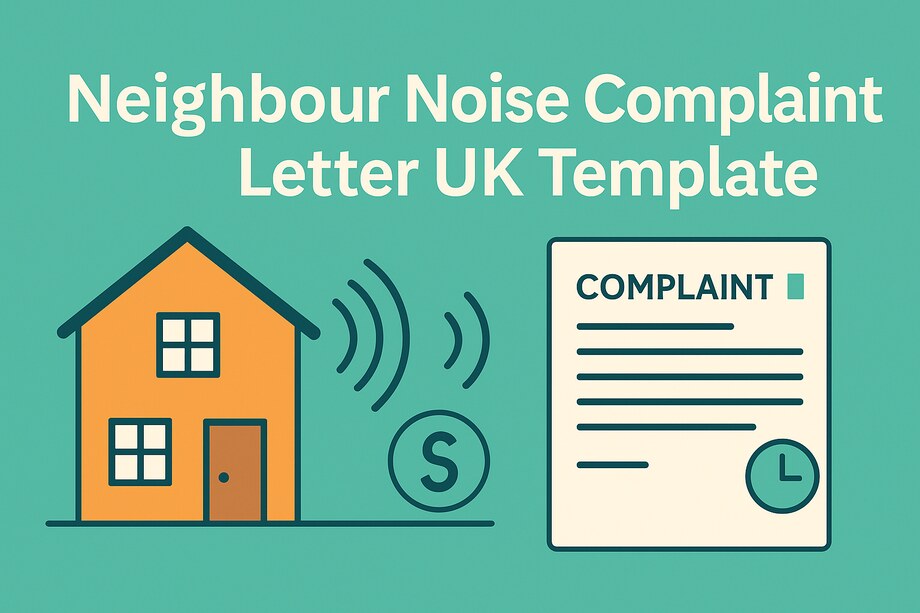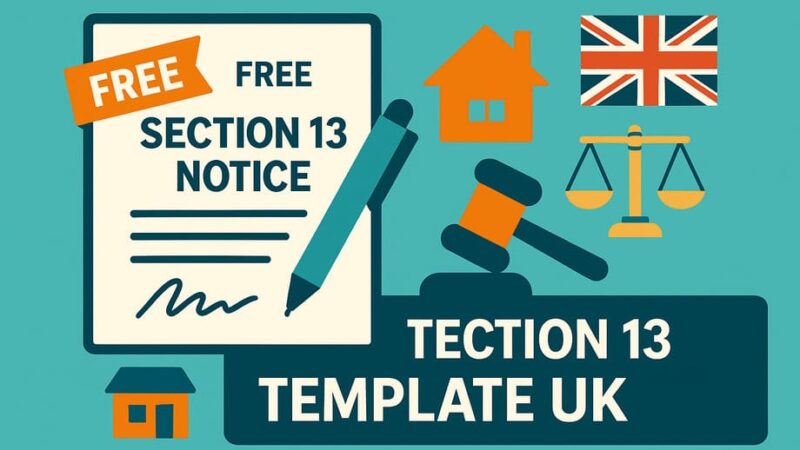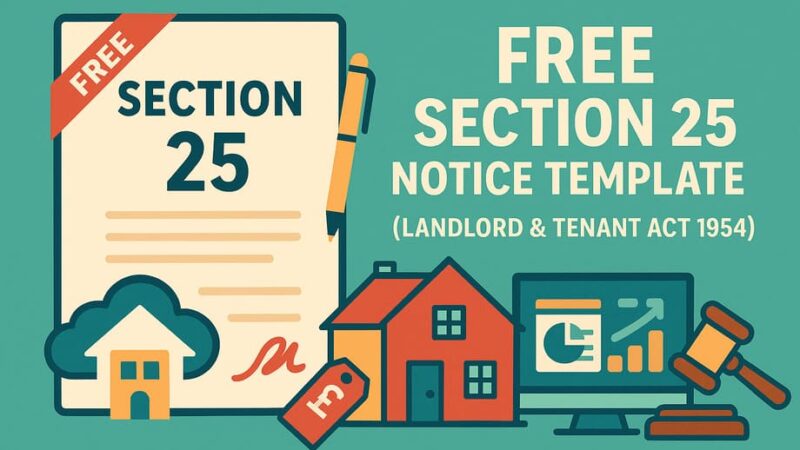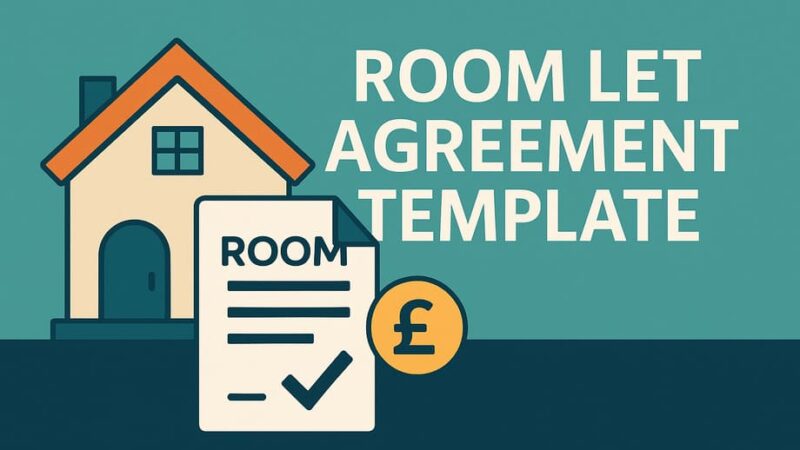Neighbour Noise Complaint Letter UK Template (Free Download)

Dealing with noisy neighbours can be incredibly stressful and disruptive to your daily life. While your first instinct might be to knock on their door or have a verbal conversation, putting your concerns in writing is often the most effective approach for resolving noise issues. A well-written complaint letter creates a formal record, demonstrates your attempts to resolve the matter amicably, and provides essential documentation if you need to escalate the issue to your local council.
This guide provides a free neighbour noise complaint letter template specifically designed for UK residents, along with guidance on what constitutes statutory nuisance, when to involve your local authority, and what steps to take if your neighbour ignores your initial complaint.
Why Written Complaints Work Better Than Verbal
While speaking to your neighbour face-to-face might seem like the most direct approach, written complaints offer significant advantages for resolving noise disputes effectively and professionally.
Creates Official Documentation
Establishes Timeline and Evidence A written complaint creates a clear record of when you first formally raised the noise issue, what specific problems you’ve experienced, and what resolution you’re seeking. This documentation becomes crucial if you need to escalate the matter to your local council or pursue legal action.
Many people underestimate how quickly memory fades regarding specific incidents. Written complaints preserve exact dates, times, and descriptions of noise disturbances that might be forgotten weeks or months later when formal evidence is required.
Supports Future Legal Action Local councils require evidence that you’ve attempted to resolve noise issues directly with your neighbour before they’ll investigate statutory nuisance claims. A written complaint demonstrates you’ve followed proper procedures and given your neighbour reasonable opportunity to address the problem.
Courts and tribunals also expect to see evidence of attempts at informal resolution before considering formal legal remedies. Professional written complaints strengthen your position significantly compared to verbal discussions that leave no permanent record.
Encourages Thoughtful Response
Reduces Emotional Confrontation Written complaints allow you to express your concerns clearly and professionally without the emotional tension that often accompanies face-to-face confrontations about noise issues. Many noise disputes escalate unnecessarily when initial conversations become heated or accusatory.
Your neighbour has time to read and consider your complaint without feeling defensive or pressured to respond immediately. This approach often leads to more constructive outcomes than doorstep arguments or heated phone calls.
Provides Clear Information Written complaints allow you to explain specific noise issues in detail, including exact times, frequency, duration, and impact on your daily life. This comprehensive information helps your neighbour understand the scope of the problem and what changes you need.
Many neighbours genuinely don’t realize how their activities affect others. A polite but detailed written explanation often resolves issues when people understand the specific impacts of their behavior.
Demonstrates Reasonable Behavior
Shows Professional Approach Taking time to write a thoughtful complaint letter demonstrates you’re approaching the situation reasonably and professionally rather than being vindictive or unreasonable. This perception helps if the dispute escalates to council involvement or legal proceedings.
Local authority officers and legal professionals respond more favorably to complainants who demonstrate they’ve tried reasonable approaches to resolve disputes amicably before seeking formal intervention.
Establishes Good Faith Efforts Written complaints show you’re making genuine efforts to resolve the situation cooperatively rather than immediately resorting to formal complaints or legal action. This good faith approach often encourages reciprocal cooperation from neighbours.
Prevents Miscommunication Written complaints eliminate the “he said, she said” problems that often complicate verbal discussions about noise issues. Both parties have the same information and can refer back to specific points without relying on potentially faulty memory.
What Counts as “Statutory Nuisance”
Understanding what legally constitutes statutory nuisance helps you determine whether your noise complaint has legal backing and what remedies might be available through your local council.
Legal Definition and Standards
Environmental Protection Act 1990 Under UK law, statutory nuisance occurs when noise “unreasonably and substantially interferes with the use or enjoyment of a home or other premises” or “injures health or is likely to injure health.” This legal standard goes beyond simple annoyance to require significant impact on daily life.
The key test is whether the noise would affect a reasonable person in your situation, not just whether it bothers you personally. Councils consider factors like noise volume, frequency, duration, timing, and the general character of the area when assessing complaints.
Reasonable vs. Unreasonable Noise Not all noise constitutes statutory nuisance. Normal household activities like walking, talking, cooking, and reasonable music or TV use are generally acceptable, even if occasionally audible to neighbors. The law recognizes that some noise is inevitable in shared living situations.
Statutory nuisance typically involves excessive volume, inappropriate timing (especially late night or early morning), persistent duration, or activities that are unreasonable for residential areas.
Common Examples of Statutory Nuisance
Loud Music and Entertainment Persistent loud music, television, or stereo systems that significantly disturb neighbors, particularly during night hours or early mornings, often constitute statutory nuisance. The volume must be unreasonably loud, not just audible.
Regular parties or social gatherings with excessive noise that disrupts neighbors’ ability to sleep, work, or enjoy their homes typically qualify as statutory nuisance, especially when they occur frequently or extend into unsociable hours.
DIY and Construction Noise Home improvement work during inappropriate hours (typically before 8 AM or after 6 PM on weekdays, or on Sundays) may constitute statutory nuisance. However, reasonable DIY work during normal hours is generally acceptable.
The use of particularly loud equipment like power tools, sanders, or drilling equipment for extended periods without consideration for neighbors can qualify as statutory nuisance, especially in densely populated areas.
Domestic Appliances and Equipment Faulty appliances that create persistent noise (like malfunctioning extractors, alarms, or heating systems) can constitute statutory nuisance if they significantly disturb neighbors and aren’t promptly repaired.
Regular use of loud equipment like pressure washers, lawn mowers, or leaf blowers during inappropriate hours or for excessive durations may qualify as statutory nuisance.
Animal Noise Persistent barking, howling, or other animal noise that significantly disturbs neighbors can constitute statutory nuisance. This typically applies to situations where animals are left alone for extended periods or aren’t properly controlled by their owners.
The noise must be unreasonable in frequency, volume, or timing rather than occasional normal animal behavior.
Factors Councils Consider
Timing and Duration Councils pay particular attention to when noise occurs and how long it continues. Night-time noise (typically 11 PM to 7 AM) receives stricter assessment than daytime disturbances. Persistent noise over several hours carries more weight than brief incidents.
Frequency and Pattern Regular, predictable noise patterns often qualify as statutory nuisance more readily than occasional incidents. Daily disturbances or multiple incidents per week demonstrate ongoing problems rather than isolated issues.
Area Character Councils consider the general character of the area when assessing complaints. Higher noise tolerance applies in busy urban areas compared to quiet residential neighborhoods. Industrial areas have different standards than purely residential zones.
Impact on Complainant The effect on your health, sleep, work, and general enjoyment of your home influences council assessments. Medical evidence of stress, sleep deprivation, or other health impacts can strengthen statutory nuisance claims.
Free Neighbour Noise Complaint Letter Template
Here’s a professional template you can customize for your specific noise complaint situation:
Neighbour Noise Complaint Letter Template
[Your Name]
[Your Address]
[City, Postal Code]
[Your Phone Number]
[Your Email Address]
[Date]
[Neighbour's Name]
[Neighbour's Address]
[City, Postal Code]
Dear [Neighbour's Name / Mr./Ms. Surname],
Re: Noise Disturbance from [Property Address]
I hope this letter finds you well. I am writing to bring to your attention
some noise issues that have been affecting my family and me at [your address].
I believe you may not be aware of how sound travels between our properties,
and I wanted to discuss this matter with you directly before involving any
external parties.
NOISE ISSUES EXPERIENCED:
The specific noise problems we have been experiencing include:
• Type of noise: [e.g., loud music, television, footsteps, DIY work]
• Timing: [e.g., weekdays after 11 PM, weekends from 7 AM, daily during work hours]
• Duration: [e.g., 2-3 hours continuously, intermittent throughout the day]
• Frequency: [e.g., every weekend, several times per week, daily]
SPECIFIC INCIDENTS:
Recent examples include:
• [Date and time]: [Specific description of noise and duration]
• [Date and time]: [Specific description of noise and duration]
• [Date and time]: [Specific description of noise and duration]
IMPACT ON MY HOUSEHOLD:
This noise is significantly affecting our daily life in the following ways:
• Disrupted sleep patterns for [family members affected]
• Difficulty working from home during [specific times]
• Inability to enjoy normal use of our [affected rooms]
• [Any health impacts - stress, sleep deprivation, etc.]
• [Impact on children's sleep/study if applicable]
UNDERSTANDING AND COOPERATION:
I completely understand that normal household activities will create some
noise, and I certainly don't expect complete silence. We all need to live
our lives comfortably in our homes. However, I hope you can understand that
the current noise levels are beyond what would be considered reasonable for
a residential area.
REQUESTED RESOLUTION:
I would be very grateful if you could help resolve this situation by:
• [Specific request - e.g., reducing volume after 10 PM]
• [Timing request - e.g., limiting DIY work to weekdays 9 AM-5 PM]
• [Equipment suggestion - e.g., using headphones for TV/music after 9 PM]
• [Other specific, reasonable requests]
I'm not trying to restrict your enjoyment of your home, but I hope we can
find a solution that works for both households.
FUTURE COMMUNICATION:
If you would like to discuss this matter, I would be happy to talk with you.
You can contact me on [phone number] or [email address]. I'm usually
available [times you're available for discussion].
NEXT STEPS:
I hope we can resolve this matter between ourselves amicably. However, if
the noise issues continue unchanged, I may need to contact our local council's
environmental health department, as persistent noise can constitute statutory
nuisance under UK law.
I would much prefer to resolve this directly with you, and I'm confident we
can find a mutually acceptable solution.
Thank you for taking the time to read this letter and for your consideration
of this matter. I look forward to hearing from you and hopefully resolving
this situation quickly.
Kind regards,
[Your Signature]
[Your Printed Name]
[Date]
P.S. I have kept a copy of this letter for my records and documented the
noise incidents mentioned. I hope this information helps you understand the
extent of the issue.
Follow-Up Letter Template (If No Response)
[Your Name]
[Your Address]
[City, Postal Code]
[Your Phone Number]
[Your Email Address]
[Date]
[Neighbour's Name]
[Neighbour's Address]
[City, Postal Code]
Dear [Neighbour's Name],
Re: FOLLOW-UP - Noise Disturbance from [Property Address]
I am writing to follow up on my letter dated [date] regarding noise
disturbances from your property. As I have not received a response and
the noise issues are continuing, I wanted to update you on the situation.
CONTINUING ISSUES:
Since my previous letter, the noise problems have continued:
• [Recent specific incidents with dates and times]
• [Any escalation or new types of noise]
• [Continued impact on your household]
ATTEMPTED CONTACT:
I have attempted to resolve this matter directly by:
• Sending my initial letter on [date]
• [Any other attempts - phone calls, door visits, etc.]
• Waiting [timeframe] for your response or improvement
STATUTORY NUISANCE WARNING:
Under the Environmental Protection Act 1990, persistent unreasonable noise
that substantially interferes with the use and enjoyment of residential
premises can constitute statutory nuisance. Local councils have legal
powers to investigate and take enforcement action against proven nuisances.
FINAL REQUEST FOR COOPERATION:
Before involving external authorities, I am making one final request for
you to address these noise issues. Specifically, I ask that you:
• [Repeat your specific, reasonable requests]
• Contact me within 7 days to discuss this matter
• Take immediate steps to reduce noise levels to reasonable levels
NEXT STEPS:
If I do not hear from you within 7 days, or if the noise issues continue
without improvement, I will contact [Local Council Name] environmental
health department to report this as a potential statutory nuisance.
I would much prefer to resolve this matter between ourselves and maintain
good neighbour relations. However, I cannot continue to accept unreasonable
noise levels that significantly impact my family's quality of life.
Please contact me on [phone number] or [email address] to discuss this
matter urgently.
Yours sincerely,
[Your Signature]
[Your Printed Name]
[Date]
Copy to: [If applicable - landlord, housing association, etc.]
What to Do If the Neighbour Ignores the Letter
When your initial complaint letter doesn’t resolve the noise issue, you have several escalation options to pursue more formal resolution of the problem.
Document Everything Thoroughly
Maintain Detailed Noise Logs Start keeping comprehensive records of every noise incident including exact dates and times, type and volume of noise, duration of each incident, and impact on your activities or sleep. This documentation becomes crucial evidence for council investigations or legal proceedings.
Use smartphone apps or simple diaries to record incidents consistently. Include details about weather conditions, other ambient noise, and whether you needed to close windows or move to other rooms to escape the disturbance.
Gather Supporting Evidence Take audio recordings where possible (though these can be technically challenging and may not capture the full impact). Photograph any visible sources of noise like outdoor equipment or gathering areas.
Collect statements from other affected neighbors who may be experiencing similar problems. Multiple complainants strengthen cases significantly and demonstrate the noise isn’t just personally sensitive.
Escalation to Landlords or Housing Associations
Identify Property Management If your neighbor rents their property, contact their landlord or housing association about the noise issues. Most tenancy agreements include clauses about not disturbing neighbors, giving landlords grounds to address problems.
Landlords often respond quickly to noise complaints because they want to maintain good relationships with other tenants and avoid having properties that cause ongoing disputes.
Provide Documentation Share copies of your complaint letters and noise logs with landlords or housing associations. This evidence demonstrates you’ve tried reasonable approaches and provides them with specific information to discuss with their tenants.
Second Formal Letter
Escalated Warning Letter Send a second, more formal letter that references your previous correspondence and warns about potential council involvement. This follow-up often motivates response when initial letters are ignored.
Include specific consequences such as council investigations, potential legal action, and the fact that statutory nuisance findings can affect property values and rental prospects.
Professional Language Maintain professional tone even when frustrated by lack of response. Aggressive or threatening language can undermine your position and may be used against you if disputes escalate to formal proceedings.
Council Environmental Health Involvement
When to Contact Council Contact your local council’s environmental health department when neighbors ignore reasonable complaints and noise continues to constitute potential statutory nuisance. Most councils require evidence that you’ve attempted direct resolution before investigating.
Council involvement is appropriate when noise significantly impacts your daily life, occurs regularly despite your complaints, involves antisocial hours or excessive volume, or affects multiple households in the area.
Evidence Requirements for Council Councils typically require comprehensive evidence including noise logs covering several weeks, copies of complaint letters sent to neighbors, recordings or witness statements where available, and details about the impact on your health and daily life.
Some councils provide noise monitoring equipment or apps to help gather objective evidence about noise levels and timing.
Council Investigation Process
Initial Assessment Council officers will review your complaint and evidence to determine whether the noise might constitute statutory nuisance. They may contact your neighbor informally to discuss the complaint and seek voluntary resolution.
Formal Investigation If informal approaches fail, councils can conduct formal investigations including site visits, noise monitoring, and witness interviews. Officers may visit at times when noise typically occurs to assess the situation directly.
Enforcement Powers When councils find statutory nuisance, they can serve abatement notices requiring specific actions to stop the nuisance. Failure to comply with abatement notices can result in prosecution and fines up to £5,000 for residential properties.
Related: Council Involvement in Noise Disputes
Understanding how local councils handle noise complaints helps you prepare effective complaints and know what to expect from the investigation process.
Council Powers and Procedures
Environmental Protection Act Authority Local councils have statutory duties to investigate noise complaints that may constitute statutory nuisance. They must investigate complaints and take appropriate action when nuisances are found to exist.
Council environmental health officers have powers to enter properties, serve legal notices, and prosecute non-compliance with noise abatement requirements.
Investigation Standards Councils use professional equipment and trained officers to assess noise complaints objectively. They consider legal standards for statutory nuisance rather than simply whether noise is annoying to complainants.
The investigation process includes gathering evidence from all parties, conducting site visits during relevant times, and applying legal tests for unreasonable interference with property enjoyment.
Preparing for Council Involvement
Evidence Gathering Standards Councils require substantial evidence to support statutory nuisance findings. Prepare comprehensive noise logs, gather witness statements from multiple affected parties, and document any attempts at informal resolution.
Consider impacts on vulnerable household members like young children, elderly residents, or people with health conditions that make them particularly sensitive to noise disturbance.
Realistic Expectations Council investigations can take several weeks or months to complete, particularly when noise patterns are irregular or seasonal. The process requires patience and continued documentation throughout the investigation period.
Not all noise complaints result in statutory nuisance findings. Councils apply legal standards that may be higher than personal tolerance levels, and they must balance competing rights of all residents.
Alternative Dispute Resolution
Mediation Services Many councils offer mediation services for neighbor disputes, including noise complaints. Professional mediators can help parties find mutually acceptable solutions without formal legal proceedings.
Mediation works best when both parties are willing to participate and compromise. Success rates are often higher than formal enforcement procedures and help preserve neighbor relationships.
Community Resolution Some areas have community resolution programs that bring neighbors together with trained facilitators to resolve disputes cooperatively. These programs focus on finding practical solutions rather than determining legal fault.
Legal Action Alternatives In extreme cases, individuals can pursue private legal action for nuisance claims through civil courts. This option requires substantial evidence and legal costs but may provide remedies when council action is insufficient.
Best Practices for Noise Complaint Success
Effective Communication Strategies
Professional Tone Maintain professional, respectful communication throughout the complaint process. Avoid accusatory language, personal attacks, or emotional outbursts that can escalate conflicts unnecessarily.
Focus on specific behaviors and their impacts rather than making character judgments about neighbors. This approach encourages cooperative responses and demonstrates reasonableness to third parties.
Specific and Reasonable Requests Make clear, specific requests for behavior changes rather than demanding complete silence. Reasonable requests are more likely to be honored and demonstrate your willingness to compromise.
Consider offering alternative solutions or timing adjustments that might meet both parties’ needs while resolving the noise issue effectively.
Long-Term Resolution Focus
Relationship Preservation Where possible, aim for solutions that preserve reasonable neighbor relationships. You’ll likely continue living near each other, making ongoing cooperation beneficial for everyone involved.
Approach complaints as problem-solving exercises rather than battles to win. This mindset often leads to more creative and sustainable solutions.
Prevention Strategies Consider physical solutions like soundproofing, white noise machines, or rearranging your living space to minimize noise impact while pursuing resolution with neighbors.
These approaches provide immediate relief while longer-term solutions are being negotiated or implemented.
Download Your Free Template
Get your professional neighbour noise complaint letter template:
- Initial complaint letter for first formal contact
- Follow-up letter for non-responsive neighbors
- Council complaint template for environmental health reports
- Noise log template for evidence documentation
Available formats:
- PDF: Print and complete by hand
- Word: Editable for specific situations
- Email templates: Digital communication versions
[DOWNLOAD PDF] | [DOWNLOAD WORD] | [NOISE LOG TEMPLATE]
Legal Disclaimer: These templates provide guidance only and should not be considered legal advice. Noise disputes involve complex legal and practical considerations that vary by situation. Consider professional legal advice for persistent problems or when considering formal legal action. Always ensure your actions comply with current environmental protection and nuisance legislation.
Dealing with noisy neighbours? Download our free complaint letter template and follow professional procedures to resolve noise disputes effectively while maintaining good community relationships.
Last Updated on August 24, 2025 by James Cartwright







![Letter to Tenant for Late Rent Payment [Free Template] 7 Letter to Tenant for Late Rent Payment [Free Template]](https://www.yourpropertyblog.co.uk/wp-content/uploads/2025/08/letter-to-tenant-for-late-rent-payment-template-800x450.jpg)